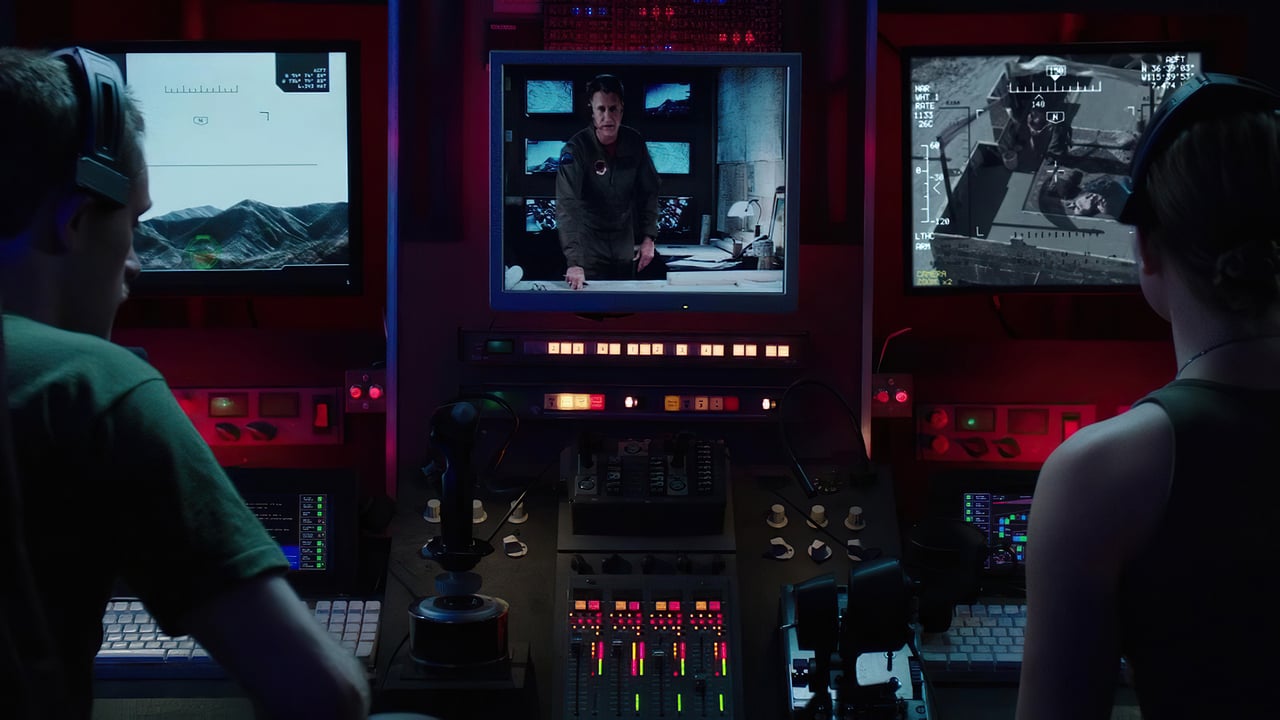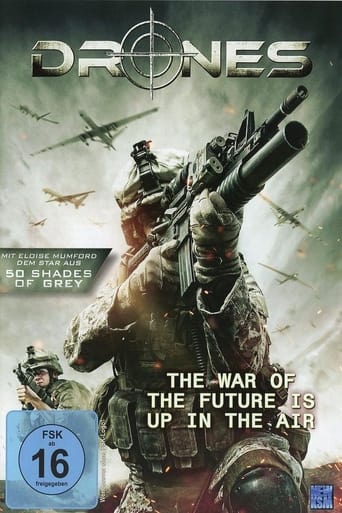

Terrible, terrible movie. Worked in the UAV field and have been involved in a kill chain before. This is a horrible reflection on how we conduct ourselves as a military and is not accurate at all. FYI, pilot in command ultimately has the right to decide to engage or not and killing civilians is the last thing that the military ever wants. This is nothing short of propaganda. There are things called rules of war and there are serious repercussions for killing civilians. I am not saying it has never happened that a civilian was killed, but I can certainly say it is not allowed to simply shoot whenever, however with no regard for that. To suggest that we would kill a bunch of kids for the sake of a single guy without any hesitation is really disgraceful and shameful. Oh and just a historical fact since I have a degree in history... We killed civilians by the thousands during WWI and WWII. Today's fighting features far less civilian casualties than "The Greatest Generation's" war. Next time, do more research Hollywood!
... View MoreI'm guessing the folks that made this movie are impressed with themselves for having the nerve to deal with such a timely and deep moral issue. Should they take the shot? The writers created a very provocative scenario that forces the choice of killing non-combatants along with the terrorist or letting the terrorist go. A long debate ensues where the characters agonize over whether to take the shot. The story's scenario is fantasy, the actions of the crew are inexcusable, and the "dilemma" faced by the crew isn't new or timely.1. The scenario where they have to shoot because the relief aircraft was diverted is unlikely at best. They are flying in a combat zone. The diverted aircraft is the only asset available in the entire area? There are no ground units, manned aircraft or unmanned aircraft from other serves available to delay the shot until the target is clear of non-combatants? If the target is that important, they would have found something somewhere to provide coverage.2. Members of the armed services usually do not have the luxury to debate the morals of lawful orders, and they are never given the option to ignore them. The chain of command would never have tolerated a junior officer and an enlisted airman ignoring orders for that long. If they were feeling generous, I guess they may have allowed one "I can't do it" but the idea of senior officers trying to reason and begging for a lieutenant and an enlisted airman to act is fantasy. This would be especially true with a high value asset like the unmanned systems. The security forces would have quickly appeared to provide a replacement crew.Military members are not given the option to ignore lawful orders. They are often not provided with why orders are given, and this still doesn't allow them to ignore the order. Requiring the chain of command to provided detailed explanations for every order would be ungainly and pointless. Sometimes obeying an order is a bit of an act of faith that the chain has access to information on which it is basing the order.3. The "dilemma" faced by the unmanned aircraft crew is not new. War is violent, destructive and weapons often hit noncombatant targets. Aerial bombing and artillery are obvious examples. It mystifies me why so many have the impression that flying a plane remotely somehow changes the dynamics of the process. Bomber pilots didn't ride their bombs to the targets, they lined a building up in a site and pushed a button. Artillery crews set angles to their guns, set the fuse, add that charge and yank a lanyard. As for the watching a target die, infantryman and snipers have been doing it for centuries.In the unlikely scenario presented in the movie, would the scenario have been less of dilemma if the unmanned aircraft hadn't been able to take the shot and something more conventional had been used to kill the terrorist? Would artillery or missile fired from a manned aircraft have resulted in fewer deaths? Or if an infantry unit had been used, would the terrorist have surrendered simply because he was near children? What if the terrorist was still killed, but managed to kill an U.S. soldier or two? Or what if he had been allowed to escape because he was near non-combatants. Would the morality of refraining from the shot justly any US soldiers or other local non-combatants he later killed? Even in the movies' unlikely and unpleasant scenario, the unmanned aircraft allowed the threat to be eliminated without exposing friendly forces to danger.War always poses many moral questions to our nation, our government and our armed forces and these questions should be asked and explored. This movie makes up an irrelevant and unlikely situation, deals with it in a completely implausible way, and the only moral dilemma it creates is why the characters were allowed to behave badly for as long as they did.
... View MoreThis is the first movie I've seen, or even heard about, that focuses entirely on military drone operators and their distant targets. Yes, there are lots of contrivances and manipulations, as well as misogynistic tones to the film, but I thought the filmmakers maintained a good deal of tension throughout and there are plenty of twists and turns here.I don't know if there is a specific agenda here or what the exact rules-of- engagement are for military drone strikes, but as noted by two reviewers before me on this site, the movie made me think as the drama unfolded and various concepts were presented on either side of the drone attacks, which I believe will be debated for many years to come.Eloise Mumford stars as Lt. Sue Lawson, who's on her first day at her job as a military drone console operator, at Creech Air Force Base, in Nevada. She's the daughter of a 4 star general, a trained boxer, and was "top stick" at the Air Force Academy before a detached retina forced her out of the skies.Matt O'Leary co-stars as Airman Jack Bowles, who's the more experienced of the two. He's the pilot at the drone controls, and has already had 23 successful "target prosecutions" over the past 11 months.The movie is almost entirely focused on their one shift to track a suspected terrorist Mahmoud Kahlil, in Afghanistan, and eliminate him with a missile strike. With Kahlil's parent's home being surveilled, it becomes apparent that Kahlil should be joining them and other family members for his birthday.However, as the tension mounts for a possible strike, a rift develops between Lt. Lawson and Airman Bowles which threatens the whole operation, despite direct orders from a supervising Colonel. As mentioned, this will lead to various dramatic twists and will escalate into a startling and disturbing ending.In summary, I thought the director Rick Rosenthal, as well as writer Matt Whitten, maintained good pacing throughout as well as a strong sense of realism. I feel this film will be controversial for many, as it raises a number of questions about drone strikes currently being used by the military.
... View MoreNot too many movies really make me think. This one did.I don't know what motivated the people that made this film, but their work stuck me much deeper than I expected.The main characters are two soldiers in a military installation where they are assigned to man a drone spy plane. They are searching for the "enemy" and when they find one the drone is equipped with weapons to "take them out." That's their job; find 'em and kill 'em. All with the push of a button.Causing collateral damage (killing innocent civilians) is supposed to be just another part of the job. After all, the good outweighs the bad because the people they kill, will themselves kill even more innocents - think 911 - if they're not stopped.This is a new form of warfare. In the "old days" you just dropped a bomb from the sky and never saw the people you incinerated. But now, super high definition cameras display the faces of the people you are about to turn into human hamburger on your computer monitor; up close and personal.The drone team think they have spotted a super enemy. A high ranking member of the Al-Qaeda that is a must kill. There's only one problem: there are a house full of innocents at the same location. This includes women and children; even a baby.Conscience begins to surface. Do they kill a dozen innocents to get this one enemy, or not? Think about what you know of Nazi soldiers who explained their actions by saying they were "just following orders."The find and kill operation takes two people to complete. One cannot fire the kill shot without the other being in compliance. Listen to the kill or don't kill conversation between our two soldiers. Ask yourself the same questions that they ask. What would you do?Don't get me wrong. I support the military. I am grateful for the men and women that have made the decision to; if necessary, lay down their lives to defend and protect this country. That means your life, my life, and the lives of all the people we know and love. Many heroic men and women have already laid down their lives in the service of their country. They deserve to be honored, they deserve our respect, they deserve our gratitude. They have mine.But this film raises moral questions about how we fight Al-Qaeda that did not exist when we fought our enemies of the past. Push button warfare. How much "collateral damage" is acceptable? Is it acceptable at all? Is there a point of depreciating returns where we become as bad; or even worse than our enemies? Take a look at the IMDb listing of the "stars" of this film. See who is ranked first, second and third. There is a reason for it.
... View More